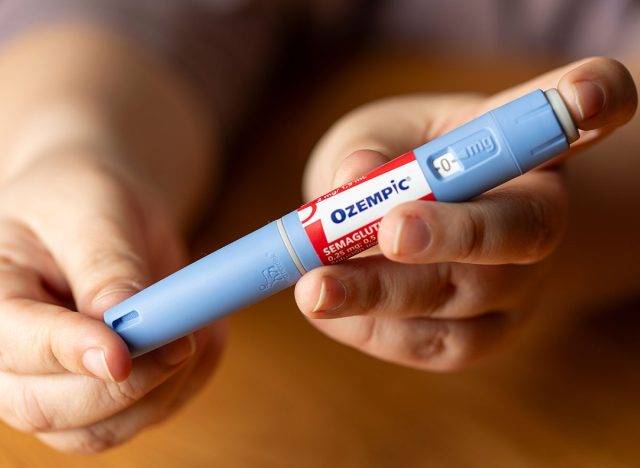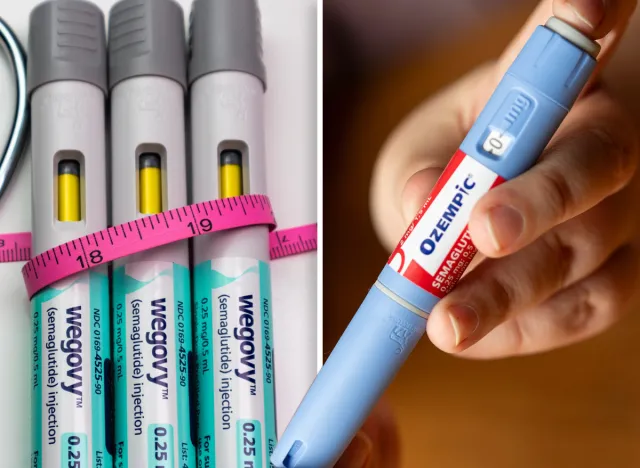7 Real GLP-1 Weight Loss Results "Nobody Talks About," Doctor Reveals

You've seen the headlines about dramatic weight loss results with GLP-1 medications. But what actually happens when you start these drugs? While social media showcases dramatic "before and after" pictures, the real journey is far more nuanced. Dr. Meghan Garcia-Webb, a Boston-based physician board-certified in Internal Medicine, Lifestyle Medicine, and Obesity Medicine, has guided hundreds of patients through their GLP-1 weight loss journeys. In her recent video, she reveals the results that most people don't discuss – from what really happens in month one to why some patients succeed while others struggle.
The First Month Surprise: Weight Loss Isn't the Main Goal
Contrary to what many expect, the first month isn't about dropping pounds. "That first month, I am not looking for any particular weight loss," Dr. Meghan explains in her post. "Whether you're on liraglutide, semaglutide, or tirzepatide, that first month is really to let your body get used to the medication and to see how significant the side effects are going to be."
According to Dr. M. Regina Castro of Mayo Clinic, this initial period is when your body begins adjusting to how the medication works: "GLP-1 agonists mimic the way a hormone called glucagon-like peptide 1 works in the body," causing changes in hunger and fullness signals.
RELATED: 20 Things You Need to Know About Ozempic and Weight Loss
The Truth About Early Rapid Weight Loss

While some patients report dramatic early results, these cases aren't typical – or even desirable. "There are always the outlier patients who month one or month two, they lose a lot of weight," Dr. Meghan notes. However, she cautions that "those people often aren't feeling great, and it's certainly not the intended or expected effect."
The Stock Market Pattern Nobody Expects

Here's what really happens: weight loss rarely follows a straight line. "I like to think about weight loss kind of like the stock market where you're looking at the overall trend," Dr. Meghan explains. "Someone in month 2, 3, or 4 may lose weight during month two, have a plateau in month three, and then lose weight again at month four. That's pretty normal."
The Hidden Impact of Your Medical History

Your personal health story significantly affects your results. "If you have a thyroid issue, if you have diabetes, you may not get as strong an effect," Dr. Meghan reveals. While thyroid issues, when treated, usually don't pose major problems, even well-controlled diabetes might affect your response to the medication.
Beyond weight loss, Mayo Clinic research shows these medications can offer additional health benefits, potentially "lowering the risk of certain serious health conditions, such as kidney disease, heart disease, heart failure, and stroke." However, these benefits can vary based on your individual health profile.
RELATED: 20 Possible Ozempic Side Effects
The Medication Battle Nobody Mentions

Common medications can secretly fight against your GLP-1 treatment. Dr. Meghan points out that "there are certain medications, Paxil, Gabapentin, there's so many out there, but if you are on a medication that is kind of fighting with your GLP-1 receptor agonist, your weight loss trajectory might not be as significant as somebody else's."
The Three-Month Decision Point

Understanding how your medications interact leads to an important timeline most people don't know about. "If they're on the maximum dose for a couple of months and they really haven't seen a significant weight loss, like 5% or more of their total body weight, then it's really time to think about getting some labs," Dr. Meghan advises.
The Truth About Switching Medications

Not seeing results doesn't mean failure – it might mean you need a different approach. As Dr. Meghan explains, "If they're taking an injectable GLP-1 Wegovy, they may want to try something like Zepbound or Saxenda, or they may want to try an oral medication."
This aligns with Mayo Clinic research showing that while "tirzepatide and semaglutide are the most effective for weight loss," different medications work better for different people. Finding the right medication often requires patience and close work with your healthcare provider.
RELATED: What Happens to Your Body When You Stop Taking Ozempic
Personalize Your Path to Success

Each patient's journey is unique, and understanding these lesser-known aspects of GLP-1 treatment can help you set realistic expectations and achieve better results. As Dr. Meghan shows, success comes from understanding and working with your body's individual response to these powerful medications. And if you enjoyed this article, don't miss 20 Incredible Ozempic Success Stories of All Time.




